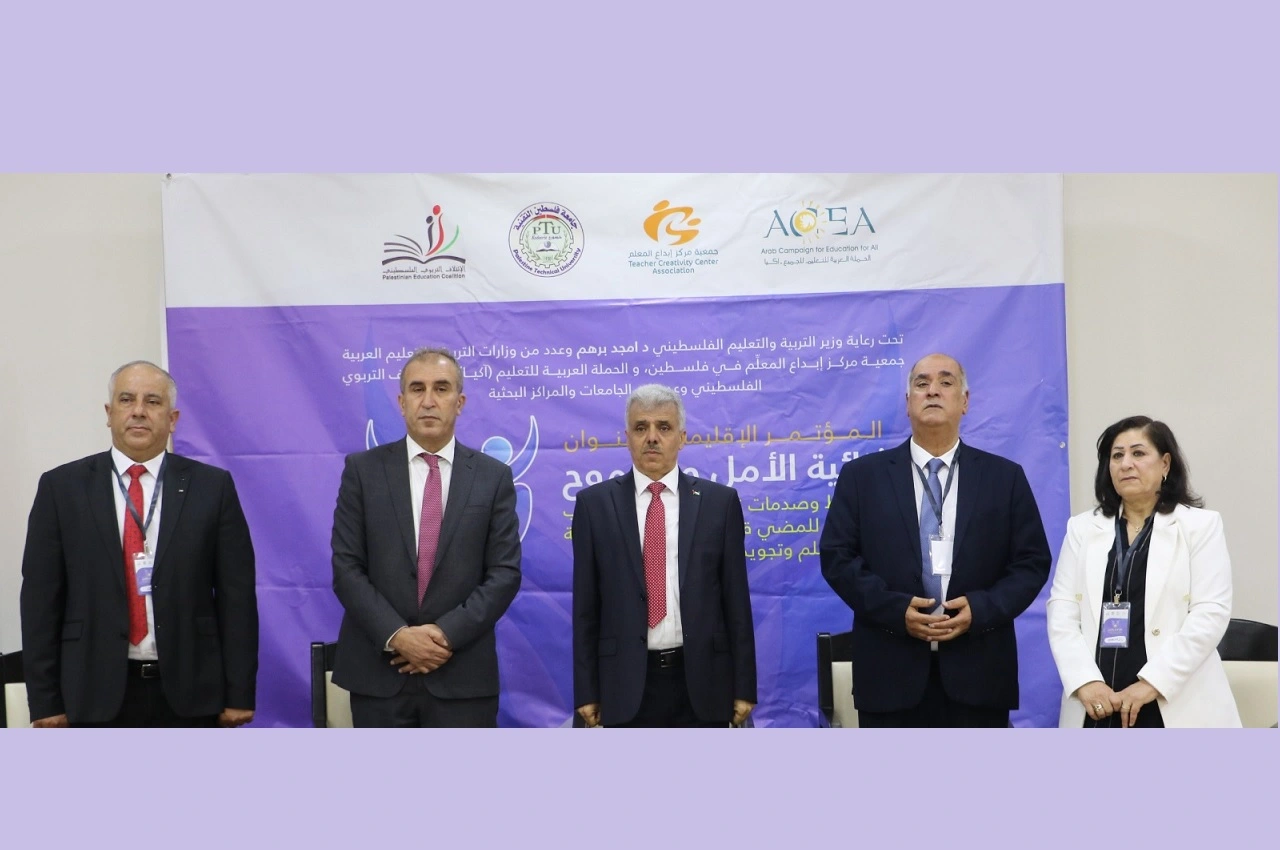


Palestine Technical University - Kadoorie concluded its participation in the Third International Conference titled "The Duality of Hope and Ambition: Psychological and Social Pressures and Traumas to Overcome for Teacher Well-Being and Educational Quality," organized by the Teacher Creativity Center in collaboration with Kadoorie University and various regional and international partners.
The conference witnessed significant attendance from representatives of ministries of education from several Arab countries, civil society organizations, and research centers, with the aim of addressing the challenges faced by teachers amidst armed conflicts and difficult conditions in Arab states.
PTUK’s Role
In his opening remarks, Dr. Ahmed Ammar, the Chair of the Preparatory Committee for the conference, Dean of the Faculty of Arts and Educational Sciences at Palestine Technical University - Kadoorie, and advisor to the Global Campaign for Education, emphasized the pivotal role of the university in organizing the conference in cooperation with Arab and international partners.
He explained that the conference seeks to shed light on the psychological and social pressures faced by teachers in war-affected countries and the impact of these pressures on the quality of education.
Dr. Ammar highlighted that Kadoorie was a key partner in the preparations, with Dr. Ammar chairing the preparatory committee, Dr. Samer Arqawi leading the media committee, and Dr. Hisham Shana'a and Dr. Inas Thait being members of the scientific and media committees, respectively.
He stressed that the primary goal of the conference is to analyze the direct and indirect effects of conflicts on teachers through three main themes: the psychological and social pressures faced by teachers, the impact of these pressures on the continuity and quality of education, and successful community initiatives to mitigate these effects.
Teachers' Struggles in Conflict Zones
In a speech by Mr. Rifaat Al-Sabbagh, President of the Global Campaign for Education and the conference chair, he affirmed that teachers in conflict-affected countries are experiencing severe psychological and health crises due to increasing pressures, which negatively affect their performance and ability to provide quality education.
Similarly, Palestinian Minister of Education Dr. Amjad Barham reviewed the significant challenges facing the education process in Palestine, particularly amidst ongoing conflicts, affirming that despite the difficult circumstances, teachers in Palestine continue their educational mission, driven by hope and ambition.
Dr. Ahmed Khalifa, Sudanese Minister of Education, discussed the impact of the war in Sudan on education, highlighting the enormous challenges faced by teachers under current conditions.
Additionally, Dr. Maria Zakaria from Somalia presented the dire situation in her country, where wars have deprived hundreds of thousands of students of their right to education.
PTUK’s Role in Supporting Education
In this context, the President of Palestine Technical University - Kadoorie, Prof. Hussein Shanak, emphasized that the university has provided substantial support to students affected by conflicts in Palestine, particularly in the Gaza Strip.
He stated that the university, from the onset of the crises, has opened its doors to students from various disciplines, aiming to provide new educational opportunities for them, underscoring that the right to education is a fundamental right that must be upheld even in the most challenging circumstances.
Prof. Shanak also added that the university will continue to offer support and contribute to improving the quality of education despite all difficulties, noting his invitation to host the next conference at the university.
Scientific Sessions on Challenges and Solutions
The scientific sessions of the conference revolved around the psychological and social pressures faced by teachers and were conducted through three sessions as follows:
• The first session, chaired by Dr. Mohammed Shahin from Palestine, featured four research papers that addressed the challenges faced by teachers during wars, such as burnout, blended learning, and psychological pressures on vocational education teachers.
• The second session, chaired by Dr. Hisham Shana'a, discussed the impact of these pressures on the continuity of education and coping strategies.
• The third session focused on successful community initiatives in addressing the effects of conflicts on education. Chaired by Dr. Afif Zaidan, participants presented five educational initiatives, including the "Community Library" initiative by Amina Al-Kayalani and the "Talent Lab" initiative by Palestine Izzat Taha.
Conference Recommendations
At the conclusion of the conference, participants presented a series of important recommendations, notably the need to strengthen psychological and social support for teachers in conflict-affected countries and to develop educational strategies to alleviate the pressures they face.
They also emphasized the importance of activating community initiatives that contribute to improving the quality of education during crises and called for intensified regional and international efforts to support education in conflict-affected Arab countries.
Participants recommended holding the next edition of the conference on the campus of Palestine Technical University - Kadoorie, highlighting its leading role in supporting education and scientific research, especially in light of the difficult conditions in the Arab region.